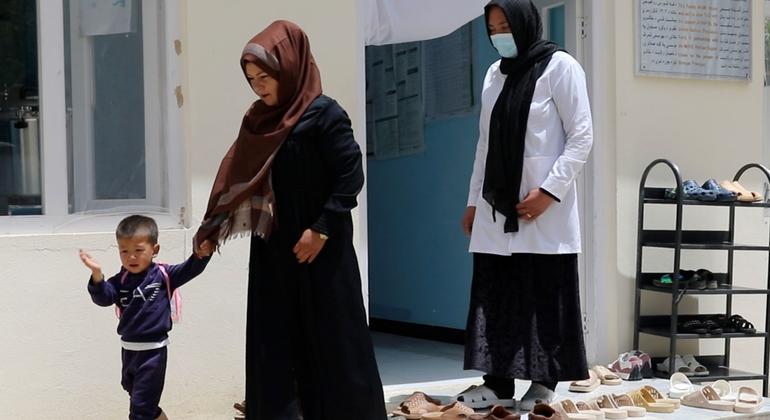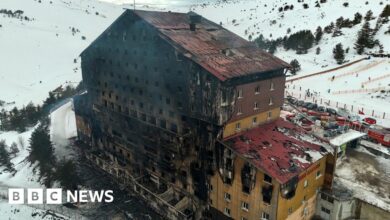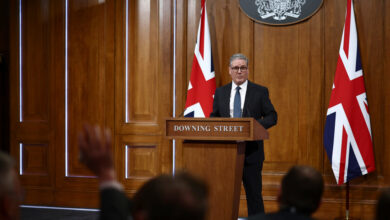Afghanistan: Meet the midwife who stayed

When foreign troops suddenly withdrew, the lives of millions of Afghans, especially women and girls, were thrown into chaos.
“If I left, a mother or a baby could have died,” Ms. Ahmadi said. “I was worried, but I couldn’t leave because people needed our services. I stayed because people, especially pregnant women, needed my support.”
Clinic closed
Public health workers were severely affected by the takeover, as hospitals and clinics were forced to close or cease operations and their staff could no longer safely go to work.
Pregnant women are worried about where to give birth because health facilities are closed, Ms Ahmadi said. United Nations Population FundThe UN sexual and reproductive health agency is supporting efforts across Afghanistan.
“So I didn’t close the family health clinic,” she said.
Find skilled health care
One of the women who sought help at the Ahangaran clinic was Sughra, 29, who was nine months pregnant.
“A few days ago, I went to the provincial hospital in Bamiyan city, but the hospital staff told me that they were not sure if the hospital would be open in the following days,” said Sughra.
Unsure of her ability to find professional medical care in the city and stressed by the ongoing security situation, she decided to go to her father’s house as soon as she felt early contractions before going into labor.
Humanity at work
Along with her husband and sister-in-law, Sughra endured a three-hour journey in a truck on rough roads to reach her father’s village.
“I was afraid I would give birth in the truck,” she recalled.
A few days later, Sughra began having labour pains and asked to be taken to the family health centre, supported by UNFPA and the only facility in the area.
“We arrived very early in the morning, but my labor lasted all day,” she said.
She gave birth to a healthy baby boy without any complications at 2pm on August 19, 2021 – World Humanitarian Day.
“The labor was very painful, but I am so glad we managed everything from the family health care home,” Sughra recalled. “If the clinic did not exist in those days, who knows what could have happened to me.”

Mariza Ahmadi has been working as a midwife at the UNFPA-supported Ahangaran family health center in Bamyan province for four years.
Committed to her country
Behind every safe birth is the courage of the midwife.
“It was a difficult situation, but the clinic did not close a single day during that time,” said Ms. Ahmadi.
“I was scared too, but if I left, all our efforts to prevent maternal and infant deaths would be in vain.”
Against the odds
Afghanistan has long had the highest maternal mortality rate in the world, with one woman dying every hour from complications during pregnancy and childbirth – deaths that could be largely prevented with proper midwifery care.
Now, as the de facto government significantly restricts women’s ability to work and travel without a male guardian, the situation has only become more dangerous for Afghanistan’s women and girls – and future generations.
Ms. Ahmadi assisted with three other deliveries that week, serving women displaced from other districts in Bamyan province.
“In the four years I have worked here, there has not been a single obstetric death at this clinic.”
Obstetric emergency
Now funded by the United States and previously by Italy, the Ahangaran Family Health Center provides life-saving healthcare to people living in isolated surrounding communities, despite being located in a remote part of Bamyan province.
Midwives could meet about 90 percent of reproductive, maternal, newborn and adolescent health needs, yet globally there is a shortage of about 900,000 trained midwives.
Afghanistan urgently needs 18,000 more people to meet the demand for skilled birth attendants, a shortage that could endanger lives and undermine the bodily autonomy of women and girls across the country.

Sughra endured a three-hour journey in the back of a truck over rough roads to reach the village health centre and give birth to her son.
Health homes help, one baby at a time
In 2021, UNFPA supported more than 70 family health facilities in Afghanistan, a number that – despite an extremely difficult operating environment – has increased sixfold to 477 today.
Since 2021, these clinics have helped more than five million Afghans access vital healthcare services, especially in remote and hard-to-reach areas.
Back home, Sughra’s son, Farhad, has just celebrated his third birthday.
“When she grows up, I hope she can study to build a good future for herself and those around her,” said Sughra.




